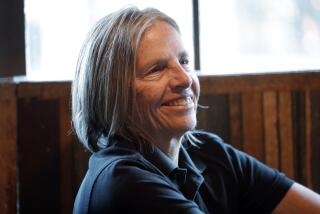A Dead Poet’s Society : GOETHE: The Poet and the Age, Volume I: The Poetry of Desire (1749-1790), <i> By Nicholas Boyle (Oxford University Press: $30; 807 pp.)</i>
- Share via
Turning an unhappy love story into literature made him a best-selling author by age 24. Readers “devoured his novel with a melting heart, their eyes trickling with voluptuous pain,” whereas his critics denounced the book as “Satan’s enticement,” calling for the censor, for fire and brimstone.
By depicting “a young man who, endowed with a deep pure emotion, gets lost in his darkest dreams,” he was the first to find words for “the nameless unrest and longing discontent which was agitating every bosom”--thus becoming the leader of the young radicals of 1774, the champion of Sturm und Drang .
Three decades later, when Napoleon had brought an end to the Holy Roman Empire of the German Nation, he summoned the author for an audience and confided that he, too, had once devoured his famous novel, “The Sorrows of Young Werther”--in fact, seven times.
Johann Wolfgang Goethe, the subject of Nicholas Boyle’s projected three-volume biography, was born in 1749 as a citizen of the Free Imperial City of Frankfurt. Germany, then a conglomerate of feudal states, had a population of 25 million people; 15% of them could read when Goethe started to write. It was the time of Frederick the Great, who considered the German language barbaric and preferred to wine and dine Voltaire in Sanssouci, discussing philosophy in French--while less enlightened German sovereigns sold their subjects by the thousands to serve in England’s war against North America.
Young Goethe was educated to be a lawyer, but seems to have been rather bored by the subject. Thanks to his early literary fame, he was invited to the tiny dukedom of Weimar to be personal adviser to a young prince. Roaming the countryside with his noble ward, he explored the pleasures of an early playboy, getting drunk with the 18-year-old ruler and fraternally sharing girls in the village barns.
Since this happened a lifetime before “liberty, equality and fraternity” were proclaimed, one might be tempted to detect a revolutionary spirit--which Goethe no doubt had. But when the French Revolution shook the old world order, he distanced himself and called for reasonable reforms, for evolution instead of revolution, envisioning a world in which an enlightened ruling aristocracy might fruitfully cooperate with an educated bourgeoisie.
After years of laborious work at the court of Weimar as a counselor and minister in charge of mines, the theater and warfare, after a strenuous (platonic) relationship with a lady-in-waiting who had restrained his wild ambitions and taught him the bittersweet efforts of sublimation, he escaped. He traveled to Italy, “to the land where the lemon trees bloom”; there he found all his unfulfilled longing as a man and a poet reawakened, fulfilled and beginning anew.
Goethe had an amazing capacity to fall in love creatively. From the time of his student days in Leipzig, where he was infatuated with an innkeeper’s daughter, to his old age, when he took the waters at Marienbad and felt a burning passion for a 17-year-old countess, he loved to enchant and be enchanted. He produced some of the most beautiful poetry as a result. During his journey to Italy, a new, sensuous aesthetic was born: He “saw with a feeling eye and felt with a seeing hand,” counting out the measures of the hexameter on his mistress’ back.
Back in Weimar, he managed to transform the provincial court into a European center of muses, attracting the great spirits of the time and persuading his duke to cut his expenses on the arms budget in favor of education, research and the arts.
After a long struggle against marriage, he got involved with a girl who worked in a factory producing artificial flowers. She moved in with him. Weimar’s nobility was scandalized. She bore his son--a bigger scandal still. She inspired him to write erotica (which the duke loved to read), and they married after 11 years.
At the end of his life, when steam engines and railways signaled the arrival of modern times, some young men, “free North Americans,” showed up in Weimar, eager to meet the cultural hero of the Western world. “With the politeness of a real gentleman,” reported one of them, “he turned the conversation to America and spoke of its hopes and promises . . . .” In 1819, he donated his selected works to Harvard University.
By the time Goethe died in 1832, the poet and painter, natural philosopher, statesman and scientist had become a monument, one of the giants of world literature. He left a life’s work of 140 volumes and has by now inspired a body of secondary literature that would take a lifetime to read.
“Enthroned like a god in eternity, high above the bustles of posterity”--that is how scholars saw him at the beginning of this century when they turned their admiring gaze heavenward. Generations of German students had his words of wisdom (“Man should be noble, helpful and good”) hammered into their heads, and those not willing to worship might well have thought, “I hate Goethe,” while sweating over those “What does the poet teach us?” compositions.
But although Goethe figures as No. 2 (after Shakespeare) on today’s list of famous European writers, historian Gordon Craig recently qualified him as the unread giant in America. Is Goethe just another dead poet in our society?
In “The Poetry of Desire (1749-1790),” Boyle (of Magdalene College, Cambridge) offers two reasons why we ought to read and study Goethe today: a scholarly one--Goethe was “a superlatively intelligent and unusually well-placed observer (who) discerned and responded to the numerous shifts in the bedrock of intellectual Europe”; and an enthusiastic one: “Goethe was a poet.”
A work of diligence, no doubt, but to enjoy the book’s high points, the reader also has to exercise determination and perseverance. Boyle’s endeavor to make Goethe accessible to the general reader as well as to the scholar may be a worthy academic ambition, but combined with numerous repetitions (due to his separation of life and work in alternating chapters), it may also confirm the student’s cherished prejudice--that the classics are dead and boring stuff.
Boyle should have known better, since the old master himself reserved some of his best humor and irony for the bookishness of the learned circles. In “Faust I,” Goethe lets the devil, disguised as a German professor, whisper subversive words into an aspiring student’s ear: “Gray, dear friend, is all theory--but green is life’s golden tree.”
More to Read
Sign up for our Book Club newsletter
Get the latest news, events and more from the Los Angeles Times Book Club, and help us get L.A. reading and talking.
You may occasionally receive promotional content from the Los Angeles Times.







